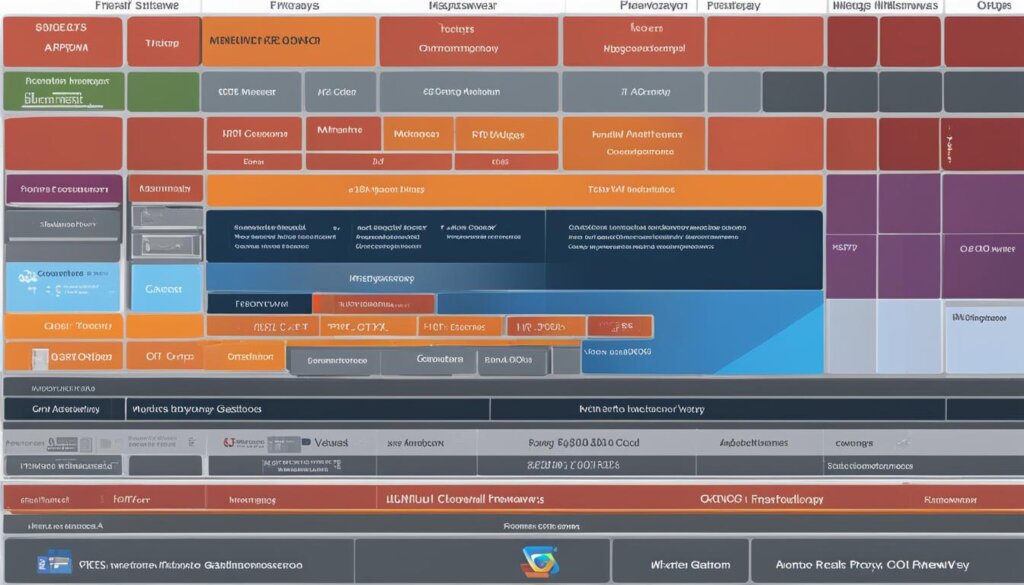Table of Contents
A gateway is a crucial component in the world of computing and network communication. It acts as a connection point, allowing different networks with different transmission protocols to communicate seamlessly. By serving as an entry and exit point for a network, all data passes through or communicates with the gateway before being routed. This ensures efficient and secure communication between networks.
Gateways play a significant role in simplifying internet connectivity by consolidating it into one device. They also have additional functionalities, such as acting as proxy servers and firewalls in enterprise environments. This enhances the security and performance of network communication.
If you’re looking to optimize your network communication, understanding gateways is essential. In this article, we’ll delve into how gateways work, the different types of gateways, their distinctions from routers, their use cases, and why they are vital in modern computing and connectivity.
How Gateways Work
Gateways, combining the functionalities of routers and modems, are strategically positioned at the edge of a network to effectively manage data communication. They play a crucial role in directing both internal and external data traffic within the network and efficiently routing it to the intended destination. Additionally, gateways store vital information regarding the network’s internal paths and any encountered additional networks. This enables gateways to act as protocol converters, facilitating smooth communication between different protocols and operating seamlessly across various layers of the OSI model.
Moreover, gateways are instrumental in establishing communication links between Internet of Things (IoT) environments and cloud platforms. By bridging the gap between these two ecosystems, gateways enable seamless data transfer, storage, and analysis, fostering efficient and reliable IoT applications.
Gateways’ Multifaceted Functionality
Gateways perform a wide range of functions, including:
- Protocol Conversion: Gateways convert data from one protocol to another, ensuring compatibility and effective communication between different networks.
- Data Routing: Gateways manage data transmission by choosing the most optimal path for efficient delivery.
- Network Information Storage: Gateways store essential information about internal network paths and any encountered additional networks, allowing for efficient data routing.
“Gateways serve as the crucial link that bridges different networks, enabling seamless communication and efficient data transmission.” – [Expert Name], [Position]
Gateways are versatile devices that excel at managing data communication, enabling connectivity, and seamlessly integrating diverse networks. Their integral role in modern networking makes understanding their functionality and capabilities crucial for businesses and individuals seeking reliable and efficient network communication.
Types of Gateways
Gateways play a crucial role in network communication and can take various forms, each serving a specific purpose in different scenarios. Let’s explore some of the key gateway types:
1. Web Application Firewalls
These gateways protect web applications from security threats by filtering traffic and preventing unauthorized access. They act as a barrier between the internet and the application, ensuring secure communication.
2. Cloud Storage Gateways
Cloud storage gateways bridge the gap between on-premises storage systems and cloud storage services. They facilitate data transfer, translation of storage requests, and seamless integration between local storage and the cloud.
3. API/SOA/XML Gateways
API, SOA, and XML gateways provide a secure and controlled interface for communication between different applications and systems. They enable seamless data exchange and ensure the integrity and security of transmitted information.
4. IoT Gateways
IoT gateways connect IoT devices and sensors to IT networks and the internet, enabling data aggregation, protocol translation, and seamless integration with cloud platforms. They serve as a communication hub for IoT ecosystems.
5. Media Gateways
Media gateways facilitate the conversion of media signals between different communication networks. They enable seamless communication between traditional telephony systems, such as PSTN or ISDN, and modern IP-based networks.
6. Email Security Gateways
Email security gateways protect against malicious emails, spam, and phishing attacks. They analyze inbound and outbound emails, filter content, and ensure secure and reliable email communication.
7. VoIP Trunk Gateways
VoIP trunk gateways enable the usage of traditional plain old telephone service (POTS) equipment in VoIP networks. They convert analog telephone signals into digital formats compatible with IP-based communication.
8. Personal Gateways
Some service providers offer their own personal gateways to customers, providing a combination of router and modem functionalities. These gateways simplify network setup and provide access to various services.
These are just a few examples of the diverse range of gateway types available. Depending on the specific network requirements and communication needs, different gateway types can be deployed to optimize connectivity and enhance overall network performance.

| Gateway Type | Function |
|---|---|
| Web Application Firewalls | Filter traffic and protect web applications |
| Cloud Storage Gateways | Bridge on-premises and cloud storage systems |
| API/SOA/XML Gateways | Enable secure communication between applications and systems |
| IoT Gateways | Connect and integrate IoT devices with IT networks and the cloud |
| Media Gateways | Convert media signals between communication networks |
| Email Security Gateways | Protect against malicious emails and filter content |
| VoIP Trunk Gateways | Enable usage of traditional telephone equipment in VoIP networks |
| Personal Gateways | Provided by service providers for simplified network access |
Difference between a Gateway and a Router
Gateways and routers play crucial roles in regulating and facilitating communication between networks. While they share similarities, it’s essential to understand the distinctions between these two networking components.
A router is primarily used to join similar types of networks, such as connecting a home or enterprise network to the internet. It determines the most efficient path for data to travel within the network and directs traffic accordingly. Routers operate on the network layer (Layer 3) of the OSI model and utilize IP addresses to identify and route data packets. They are instrumental in managing internal network traffic and ensuring seamless connectivity for devices within the same network.
On the other hand, gateways are specifically designed to connect dissimilar networks that use different primary protocols. They serve as an entry and exit point for data to pass through when joining networks with varying transmission protocols. Gateways can operate on multiple layers of the OSI model (Layers 3, 4, and 5) and perform protocol conversion tasks. Their purpose is to enable communication between networks that would otherwise be incompatible due to different protocols.
Here’s a comparison at a glance:
| Gateway | Router |
|---|---|
| Connects dissimilar networks | Connects similar networks |
| Acts as an entry and exit point for data | Determines the most efficient path for data routing |
| Performs protocol conversion tasks | Employs IP addresses to identify and route data |
| Operates on multiple layers of the OSI model | Primarily operates on the network layer |
It’s important to note that while a router can be considered a gateway, a gateway may not always be considered a router. This distinction emphasizes their specific roles and functionalities within the networking infrastructure.
Gateway Use Cases
Gateways play a crucial role in enabling effective communication and connectivity in various scenarios. Let’s explore some of the key use cases for gateways:
- LAN or WAN Access: Gateways provide both local area network (LAN) and wide area network (WAN) access to the internet. They act as the gateway between the local network and the internet, allowing devices to connect, browse, and communicate.
- Legacy Analog Voice and Fax Translation: Gateways play a significant role in translating legacy analog voice and fax transmissions into modern digital VoIP (Voice over Internet Protocol) protocol. This ensures seamless integration between traditional telephone systems and IP-based networks.
- IoT Device Connectivity: Gateways are essential for connecting Internet of Things (IoT) devices to IT networks and servers. They act as a bridge, enabling smooth communication between IoT devices and the central infrastructure, allowing for data collection, analysis, and control.
- Cloud Storage Service API Translation: Gateways facilitate the translation of cloud storage service application programming interfaces (APIs). They enable seamless integration and interoperability between different cloud storage providers, ensuring data compatibility and efficient data management.
- Specialized Application Connectivity and Security: Gateways ensure seamless connectivity and security for specialized applications. They provide a way to securely access and transmit data between specific applications and networks, protecting valuable information from unauthorized access.
- Faster Cellular Data Access: Gateways enable faster data access over cellular networks by utilizing advanced technologies such as 4G and 5G. They optimize network connections, allowing for improved speed, reliability, and bandwidth, enhancing the overall mobile data experience.
- All-in-One Gateways/Routers: Internet service providers (ISPs) often provide all-in-one gateways/routers that serve as a single device for wireless internet access. These gateways combine the functions of a modem and a router, simplifying the setup and management of home or small office networks.
As gateways facilitate these use cases, they enable different devices and networks to communicate effectively, enhancing networking and communication capabilities in a variety of contexts.
Final Thoughts on Gateways
Gateways are vital components in modern computing and networking. They play a crucial role in bridging the gap between networks with different protocols, enabling seamless communication and connectivity. Whether it’s connecting devices to the internet, translating protocols, ensuring secure application access, or facilitating IoT and cloud integration, gateways are instrumental in optimizing network communication.
To fully harness the power of gateways, it is essential to understand their functionality and the different types available. By familiarizing yourself with the capabilities of gateways, individuals and businesses can make informed decisions and maximize the potential of their networks.
Gateways are the gatekeepers of efficient networking and connectivity. They facilitate the smooth flow of data and information, allowing diverse devices and networks to interact seamlessly. By embracing the power of gateways, you can unlock a world of possibilities in communication, collaboration, and innovation.
FAQ
What is a gateway in computing?
A gateway is a network node used in telecommunications that connects two networks with different transmission protocols together. It serves as an entry and exit point for a network, allowing all data to pass through or communicate with the gateway before being routed.
How do gateways work?
Gateways manage all data directed internally or externally from a network and route it to the destination through the most efficient path. They also store information about the network’s internal paths and any additional networks encountered. Gateways act as protocol converters, facilitating compatibility between two protocols and operating on any layer of the OSI model. They can also create communication links between IoT environments and the cloud.
What are the types of gateways?
Gateways can take various forms and perform different tasks. Examples include web application firewalls, cloud storage gateways, API/SOA/XML gateways, IoT gateways, media gateways, email security gateways, and VoIP trunk gateways. Each type serves a specific purpose, such as filtering traffic, translating storage requests, managing service traffic, aggregating sensor data, converting network data formats, preventing malicious emails, and facilitating plain old telephone service equipment usage in a VoIP network.
What is the difference between a gateway and a router?
Routers are used to join similar types of networks, while gateways are used to join dissimilar networks. Routers connect a home or enterprise network to the internet, while gateways connect networks that use different primary protocols. A router may be considered a gateway, but a gateway is not always considered a router.
What are the use cases for gateways?
Gateways are used in various scenarios. They provide LAN or WAN access to the internet, translate legacy analog voice and fax transmissions into digital VoIP protocol, connect IoT devices to IT networks and servers, translate cloud storage service APIs, ensure seamless connectivity and security for specialized applications, enable faster cellular data access, and provide wireless access through all-in-one gateways/routers provided by ISPs. Gateways play a crucial role in enabling different devices and networks to communicate effectively.
What is the significance of gateways in networking?
Gateways bridge the gap between different networks with different protocols, facilitating seamless communication and connectivity. Whether it’s connecting devices to the internet, translating protocols, ensuring secure application access, or enabling IoT and cloud integration, gateways play a critical role in modern computing and networking.













